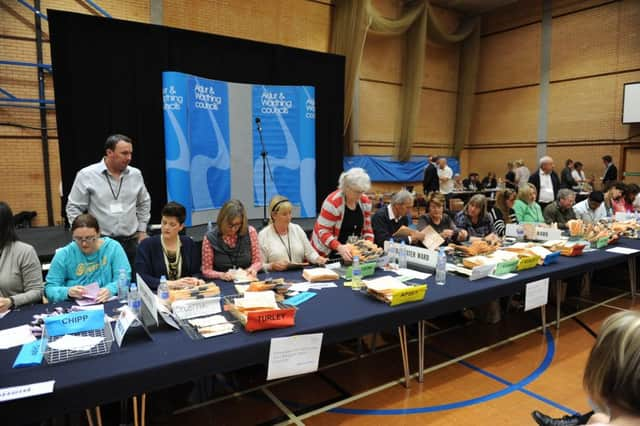Special stationery, 32-hour days and nervy waits: behind the scenes on polling day


From the special election pencils to caffeine-fuelled officials working up to 32 hours without sleep, the big day can only go smoothly if hundreds of individuals pull together.
But even with the best intentions, the Great British Public can often cause a hitch.
Advertisement
Hide AdAdvertisement
Hide Ad“When I was presiding officer in London, I opened the doors to find a man with a writ on behalf of the residents of the galaxy,” said Alex Bailey, returning officer for Worthing West and East Worthing and Shoreham constituencies on May 7.
“While I smiled I thought what on earth do I do? You have to prepare for the extraordinary and diverse individuals.”
Polling day is a hectic time for the returning officer, who ensures the election is run lawfully, and presides over officers at the polling stations and counters who will pour through tens of thousands of voting forms.
Final preparations start the night before, with ballot boxes taken out of storage and delivered to polling stations along with the key pieces of equipment.
Advertisement
Hide AdAdvertisement
Hide AdThe ballot boxes are cleaned, filled with the contents of the polling station packs, including items such as stationery and signage.
Of key importance are the election pencils, ordered from a single Government-approved company, Shaws.
Mr Bailey said: “Once the election is completed, spare stationery is often distributed to local schools and charities.
“We have even had reports that electoral pencils have been sent to Africa.
Advertisement
Hide AdAdvertisement
Hide Ad“They are special in that they use a certain type of lead which is supposed to be very hard to rub out.”
Before the doors open, the ballot boxes are checked before being securely sealed.
Voters are admitted from 7am, with candidates often arriving at polling stations early.
Councillor Sean McDonald, elected last year, recalls ensuring he was first to the sole polling station in his ward.
Advertisement
Hide AdAdvertisement
Hide AdHe said: “I turned up at about 6.40am to get the best position and stood there for 15 hours. There was another candidate there who asked if I was going to stand there all day.
“I said ‘yes, I haven’t got anything better to do’.
“The count was a whole roller coaster of emotions. It was so nerve-racking and I was so taken aback to win.”
Dr James Walsh, who sits on West Sussex County Council, Arun District Council and Littlehampton Town Council, remembers the first time he was elected 40 years ago.
Dr Walsh said he could recall feeling ‘elated’ as he was declared winner at both district and borough level.
Advertisement
Hide AdAdvertisement
Hide AdHe said: “It was a combination of a campaign to get a swimming pool built in Littlehampton and trying to get other things improved in town and I’ve tried to continue that for the last 30 or 40 years.
“I was very elated, very relieved and very grateful that the people had responded to my campaign.”
One of the potential issues at polling stations during the day is the interference of ‘tellers’, who are tasked with counting the number of people turning out on behalf of various parties.
While they may approach voters outside polling stations, they must not intimidate, impede or see or hear what is happening inside, nor must they campaign for a particular candidate or issue.